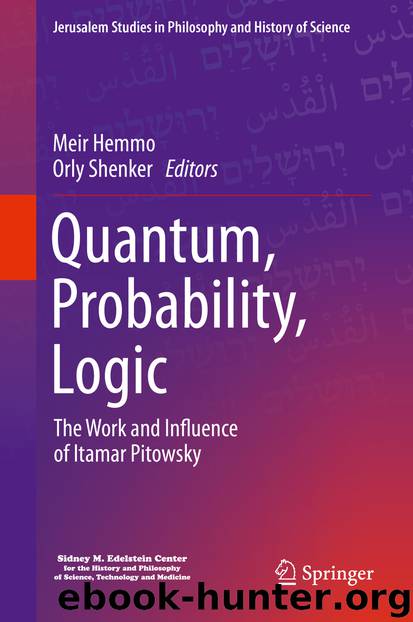Quantum, Probability, Logic by Unknown

Author:Unknown
Language: eng
Format: epub
ISBN: 9783030343163
Publisher: Springer International Publishing
12.5 Bub’s Information-Theoretic Interpretation of QT
According to Jeff Bub, QT is a non-representational, probabilistic theory. Yet, while rejecting a traditional representational interpretation of the quantum state, his information-theoretic approach interprets the quantum state ontically, as a physical state, a complete description of a quantum system (Bub 2016, p. 222). More specifically, QT is a theory about information ‘in the physical sense’: a structure of correlations between intrinsically random events, which is different from the classical structure of correlations measured by Shannon information. Moreover, according to Bub, information is a new kind of physical primitive, whose structure “imposes objective pre-dynamic probabilistic constraints on correlations between events, analogous to the way in which Minkowski space-time imposes kinematic constraints on events” (Bub 2018, p. 5).
Bub adopts and contributes to Pitowsky’s analysis of the two dogmas (Bub and Pitowsky 2010; Bub 2016, § 10) and in fact he also puts them at the origin of the issues gravitating around the measurement problem. However, the application of HH’s argument to Bub’s information-theoretic interpretation shows that the rejection of the two dogmas is not sufficient to solve the measurement problem.
In HH’s thought experiment, in fact, QT provides contrasting instructions for the prediction of measurement results. The qBist way out to inconsistency is relativizing the quantum state to single observers. In Bub’s interpretation, on the other hand, the quantum state represents an objective probabilistic structure that constrains the system’s behaviour. This means that the probabilities codified by QT are objective, and therefore that different observers must associate the same measurement with the same predictions. In Bub’s account, QT is not a single-user theory: through its use, Wigner and Friend must be able to come to agreement.
Let’s wrap up the results achieved so far. Contrarily to HH’s conclusions, their argument does not rule out black-box interpretations of QT; however, Qbism escapes failure by embracing an extremely subjective view of the quantum state that, although dragging QT out of the realm of empirical sciences, allows to consistently disattend constraints imposed to such sciences. Bub, on the other hand, puts forward an information-theoretic account of QT which has the merit of maintaining the empirical import not only of Hilbert space, but also of the quantum state. Regaining the empirical import of the theory, however, means losing the possibility to exploit the qBist solution to HH’s test, because, as any other empirical theory, it must be empirically adequate and provide an intersubjective description of the non-perspectival features of our experiences.
In the next section I will discuss Pitowsky’s information-theoretic interpretation, a kind of compromise in between the extreme subjectivism of Qbism, and Bub’s ontic approach.
It has to be said that Bub has recently addressed the issue of Wigner’s Friend scenarios in the information-theoretic interpretation. However, since this new contribution have several points of intersection with Pitowsky’s account, it would be useful to discuss it also with his epistemic version of the information-theoretic approach in mind.
Download
This site does not store any files on its server. We only index and link to content provided by other sites. Please contact the content providers to delete copyright contents if any and email us, we'll remove relevant links or contents immediately.
Embedded Programming with Modern C++ Cookbook by Igor Viarheichyk(4175)
Implementing Cellular IoT Solutions for Digital Transformation by Dennis McCain(4076)
Linux Device Driver Development Cookbook by Rodolfo Giometti(4071)
Embedded Linux Development Using Yocto Project - Third Edition by Otavio Salvador & Daiane Angolini(3931)
TinyML Cookbook by Gian Marco Iodice(3837)
Simplifying 3D Printing with OpenSCAD by Colin Dow(2946)
TinyML Cookbook by Gian Marco Iodice & Ronan Naughton(2696)
Fusion 360 for Makers by Lydia Sloan Cline(2356)
Networking A Beginner's Guide by Bruce Hallberg(2345)
Hands-On Linux for Architects by Denis Salamanca(2174)
Computers For Seniors For Dummies by Nancy C. Muir(2142)
But How Do It Know? by J. Clark Scott(2119)
Raspberry Pi and MQTT Essentials by Dhairya Parikh(2089)
Arduino Project Handbook, Volume 2: 25 Simple Electronics Projects for Beginners by Geddes Mark(2049)
9781803246888-ENHANCING DEEP LEARNING WITH BAYESIAN INFERENCE by Unknown(2016)
Hack and HHVM by Owen Yamauchi(2007)
31 Days Before Your CompTIA A+ Exams (Shanette Luellen's Library) by Benjamin Patrick Conry(1971)
Hands-On Internet of Things with MQTT by Tim Pulver(1877)
MicroPython Projects by Jacob Beningo(1876)
